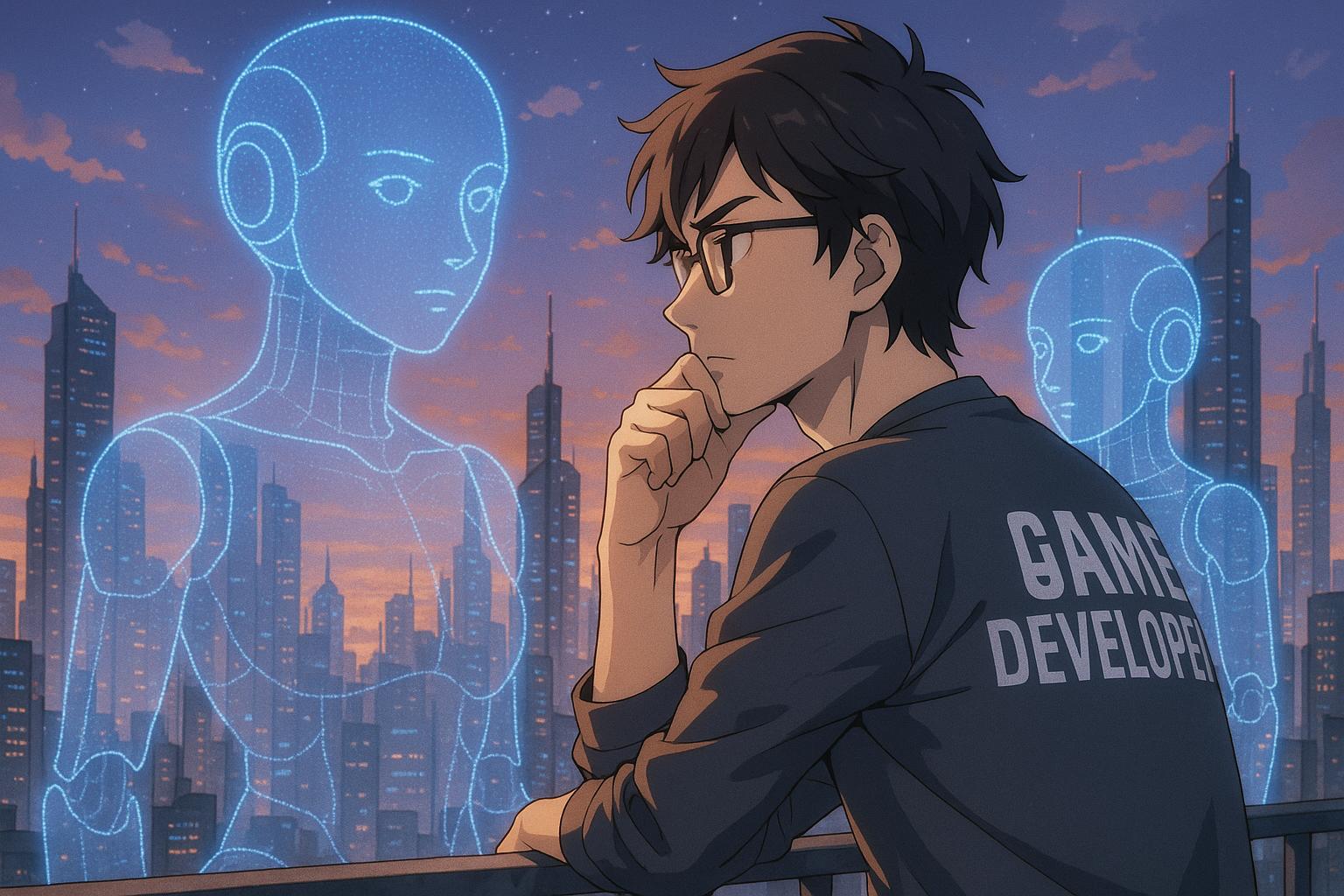Major game publishers Take-Two Interactive and Electronic Arts have expressed growing concerns over generative AI’s impact on player trust, creativity, and ethical considerations. Their caution marks a shift from tech industry optimism as debates intensify on AI’s role in game development and content quality.
The conversation surrounding the integration of generative AI in the video game industry has taken a significant turn, with major publishers like Take-Two Interactive, the force behind the highly anticipated GTA 6, stepping back from the prevailing optimism about the technology. In recent financial disclosures, both Take-Two and Electronic Arts (EA) highlighted risks associated with generative AI, with Take-Two noting “negative user perceptions” towards automation and AI, while EA pointed out the “social and ethical issues” posed by the technology. These comments underline a growing hesitance among industry giants amidst a backdrop of increasing player pushback and public skepticism.
This cautious approach contrasts starkly with the more enthusiastic adoption of generative AI by tech behemoths such as Google. While these companies tout the transformative potential of AI, many within the gaming sector are wary, especially after Take-Two’s decision to delay the release of GTA 6 to 2026. The fear of alienating their audience seems to be guiding major studios as they tread carefully in this new technological landscape. According to a report, 52% of game developers are already engaged with generative AI in their work, yet over a quarter express concerns that such integration could detrimentally affect the industry, highlighting increasing apprehension around issues like IP theft and the potential quality decline of game content.
Take-Two’s CEO, Strauss Zelnick, has been vocal about his belief that the essence of great gaming lies in human creativity. In discussions about the future of AI in gaming, he has asserted that while AI can offer efficiencies, the most captivating games will always emerge from the unique vision and originality of human creators. In an interview for Carolyn Dailey’s book ‘The Creative Entrepreneur,’ Zelnick was clear that successful gaming experiences cannot be simply assembled from existing datasets; they require innovation that AI cannot replicate. His perspective reflects a broader sentiment within the industry, where many acknowledge that, despite the potential advantages of AI, the risk of homogenised content looms large.
Moreover, the balance between innovation and ethical considerations continues to be a major concern for developers. A recent survey revealed that although many companies utilise generative AI, there is a growing belief among developers that it negatively impacts the gaming landscape. Issues such as job losses due to automation, coupled with fears that AI-generated content may lack the depth provided by human creators, are contributing to a significant backlash from both developers and players alike. Critics argue that the reliance on AI could stifle creativity and lead to a market saturated with lower-quality offerings.
As Zelnick pointed out during a financial call, AI tools should be regarded as means to improve construction processes rather than as replacements for the human touch that has defined the gaming industry. He firmly believes that the essence of entertainment should remain forward-looking, dismissing the idea that AI, which operates on historical data, could ever truly grasp the nuances of creativity. His assertion encapsulates the ongoing debate in the industry: can a machine truly capture the spirit of innovation, or will it merely regurgitate what has come before?
While the future role of AI in gaming remains uncertain, it is clear that the industry is at a pivotal moment. As developers navigate the balance between leveraging new technology and maintaining the integrity of creative expression, the conversation around generative AI is likely to evolve. Increased scrutiny on ethical practices and job implications will continue to shape how the industry embraces this technology, ensuring that the path forward is marked by both innovation and caution.
Reference Map:
- Paragraph 1 – [1], [4]
- Paragraph 2 – [1], [2], [5]
- Paragraph 3 – [3], [6]
- Paragraph 4 – [5], [2]
- Paragraph 5 – [6], [7]
Source: Noah Wire Services
- https://www.gadgetguy.com.au/gta-take-two-ea-negative-ai-perception/ – Please view link – unable to able to access data
- https://www.ft.com/content/7cd6e16e-c506-4df0-b57d-f2f5634c6c62 – This article discusses the integration of artificial intelligence (AI) into the video game industry, highlighting both excitement and concern among developers and players. While AI has been central to gaming through ‘classical AI,’ newer technologies like machine learning and generative AI are enabling dynamic content creation, NPC dialogue, environment adaptation, and asset generation. Some developers and companies, such as Electronic Arts and Google Cloud, herald AI as revolutionary, comparing its impact to that of 3D graphics. However, practical application remains inconsistent, with high-profile prototypes from Ubisoft, Microsoft, and Google demonstrating potential but not yet mainstream-ready. Smaller studios and indie developers are experimenting more freely, incorporating AI into narrative and gameplay. Yet, big studios proceed cautiously, with many privately exploring AI tools but avoiding public endorsement due to legal, ethical, and quality concerns. Critics argue current AI outputs lack depth, may flood the market with low-quality content, and pose risks to jobs and intellectual property. Ethical questions surrounding training data and the potential erosion of human creativity further complicate adoption. While AI may soon become more widespread in game development, its ultimate role—hero or villain—remains undecided as the industry navigates technical, cultural, and economic uncertainties.
- https://www.gamesradar.com/games/grand-theft-auto/ahead-of-gta-6-take-two-ceo-says-hes-not-worried-about-ai-creating-hits-because-its-built-on-recycled-data/ – Ahead of the release of GTA 6, Take-Two CEO Strauss Zelnick has expressed confidence in the superiority of human creativity over AI-generated content. In an interview for Carolyn Dailey’s book ‘The Creative Entrepreneur,’ Zelnick emphasized that true success in the gaming industry comes from fostering originality and innovation among creators. He criticized the derivative nature of AI, arguing that big hits must be ‘created out of thin air’ and cannot stem from recycled data. Zelnick pointed out that while AI can reassemble existing data, groundbreaking and unexpected creative works are the result of human passion and unique vision. He stressed that Take-Two’s strategy involves hiring the best creators and encouraging them to avoid copycat works, instead aiming to introduce unprecedented and forward-thinking ideas.
- https://www.gamespot.com/articles/study-finds-majority-of-game-dev-companies-use-generative-ai-already-despite-worker-concerns/1100-6528919/ – The results of the 13th annual State of the Game Industry Survey have been released, shining a light on how developers feel about all manner of hot-button industry topics, including generative AI. The majority of surveyed developers (52%) said they work for companies that use generative AI, with 36% reporting that they personally use such tools for game development. While the majority of surveyed developers are working at companies that use generative AI, 30% of respondents said they believe generative AI is having a negative impact on the video game business (up 12% from 2023). The surveyed developers cited things like IP theft, energy consumption, and AI program biases as contributing to their feelings toward generative AI.
- https://swapnilmore03.medium.com/the-hidden-dangers-of-ai-in-gaming-job-losses-creativity-crisis-and-player-backlash-cc716bfdceb0 – This article explores the potential negative impacts of AI integration in the gaming industry, focusing on job losses, creativity crises, and player backlash. It highlights how AI is replacing human roles in game art, design, writing, and quality assurance, leading to significant layoffs and studio closures. The piece also discusses the potential erosion of human creativity due to AI-generated content and the ethical concerns surrounding AI’s role in game development. Additionally, it addresses the backlash from players who feel that AI-generated content lacks the depth and authenticity of human-created material.
- https://gameworldobserver.com/2023/05/18/take-two-ai-financial-report-fy23-gta-6-hint – Take-Two has released its financial report for the fiscal year ended March 31. The company also shared its stance on AI and provided new information about its business strategy and future game releases. During an earnings call, CEO Strauss Zelnick said Take-Two is ‘enthusiastic’ about AI because it would allow it to improve efficiency with better tools. However, he believes that big hit games will still be created by real humans. Zelnick added that all large language models are based on data sets, which by definition, are backward-looking, while hits in the entertainment business are always forward-looking. He emphasized that a machine is not going to be able to look forward and that to confuse that result with intelligence and creativity is like confusing a magic trick with magic.
- https://www.videogameschronicle.com/news/take-two-ceo-says-ai-could-increase-employment-and-productivity-as-long-as-ip-isnt-infringed/ – Take-Two Interactive CEO Strauss Zelnick says not only does he think AI won’t lead to job losses, he believes it could lead to increased employment. In an interview with GamesIndustry.biz, Zelnick was asked what role AI plays in Take-Two‘s strategy, and whether there are any guardrails the industry needs to implement to protect itself. Zelnick replied by saying he feels AI is just another tool, that he’s certain it won’t lead to redundancies and that it will help productivity and profitability. He emphasized that AI is an oxymoron, there’s no such thing, and that machines don’t learn. He believes that AI will help make their business more efficient and help them do better work, but it won’t reduce employment.
Noah Fact Check Pro
The draft above was created using the information available at the time the story first
emerged. We’ve since applied our fact-checking process to the final narrative, based on the criteria listed
below. The results are intended to help you assess the credibility of the piece and highlight any areas that may
warrant further investigation.
Freshness check
Score:
8
Notes:
The narrative was published on 26 May 2025, making it current. The content references recent financial disclosures from Take-Two and EA, indicating timely reporting. However, similar discussions about AI in gaming have been reported since at least November 2024, suggesting the topic has been ongoing. ([gizmodo.com](https://gizmodo.com/grand-theft-auto-publisher-says-ai-wont-help-it-make-games-faster-2000523084?utm_source=openai)) The article appears to be original, with no evidence of recycled content.
Quotes check
Score:
7
Notes:
The article includes direct quotes from Take-Two CEO Strauss Zelnick regarding AI’s role in game development. These quotes have been reported in previous articles from March 2025, indicating they are not exclusive to this narrative. ([gamesradar.com](https://www.gamesradar.com/games/grand-theft-auto/take-two-ceo-says-ai-users-who-think-they-can-push-a-button-and-say-create-the-next-gta-6-are-completely-wrong-the-big-creative-leaps-forward-will-be-generated-by-humans/?utm_source=openai)) The wording of the quotes matches earlier reports, suggesting they are reused.
Source reliability
Score:
6
Notes:
The narrative originates from GadgetGuy, an Australian technology news outlet. While it provides references to reputable sources like Bloomberg and financial filings from Take-Two and EA, the outlet itself is not widely recognized internationally. The article includes links to original sources, enhancing its credibility.
Plausability check
Score:
8
Notes:
The claims about Take-Two and EA acknowledging risks associated with generative AI align with recent industry discussions. For instance, Take-Two’s disclosure mentioned ‘negative user perceptions as to automation and AI,’ and EA’s filing highlighted ‘social and ethical issues.’ The narrative’s tone and language are consistent with industry reporting, and the structure is focused on the topic without excessive or off-topic details.
Overall assessment
Verdict (FAIL, OPEN, PASS): OPEN
Confidence (LOW, MEDIUM, HIGH): MEDIUM
Summary:
The narrative is current and addresses ongoing industry concerns about AI in gaming. However, it relies on previously reported quotes and information, which may affect its originality. The source is less established, which introduces some uncertainty regarding its reliability. Overall, the narrative presents plausible claims consistent with industry trends, but the reliance on earlier reports and the source’s credibility warrant further verification.













